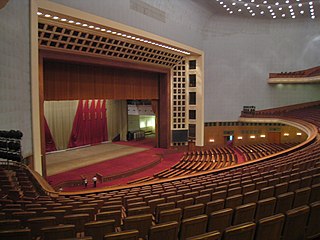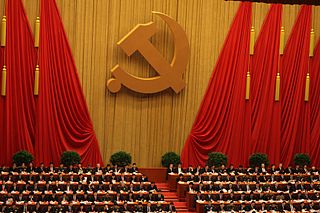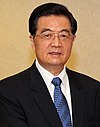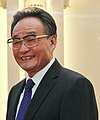
The Politburo Standing Committee (PSC), officially the Standing Committee of the Political Bureau of the Central Committee of the Communist Party of China, is a committee consisting of the top leadership of the Chinese Communist Party (CCP). Historically it has been composed of five to eleven members, and currently has seven members. Its officially mandated purpose is to conduct policy discussions and make decisions on major issues when the Politburo, a larger decision-making body, is not in session. According to the party's constitution, the General Secretary of the Central Committee must also be a member of the Politburo Standing Committee.

Wen Jiabao is a Chinese retired politician who served as the premier of China from 2003 to 2013. In his capacity as head of government, Wen was regarded as the leading figure behind China's economic policy. From 2002 to 2012, he held membership in the Politburo Standing Committee of the Chinese Communist Party, the country's de facto top power organ, where he was ranked third out of nine members and after general secretary Hu Jintao and Wu Bangguo, chairman of the Standing Committee of the National People's Congress.

Zeng Qinghong is a retired Chinese politician. He was a member of the Politburo Standing Committee of the Chinese Communist Party, China's highest leadership council, and First Secretary of the Secretariat of the Central Committee between 2002 and 2007. He also served as the Vice President of China from 2003 to 2008. During the 1990s, Zeng was a close ally of then-Party general secretary Jiang Zemin, and was instrumental in consolidating Jiang's power. For years, Zeng was the primary force behind the party's organization and personnel.
The Shanghai clique, also referred to as the Shanghai gang, Jiang clique, or Jiang faction, refers to an informal group of Chinese Communist Party (CCP) officials who rose to prominence under former CCP General Secretary Jiang Zemin while he served as the party chief and mayor of Shanghai.
Generations of Chinese leadership is a term historians use to characterize distinct periods of the leadership of the Chinese Communist Party (CCP) and, by extension, successive changes in the ideology of the CCP. Historians have studied various periods in the development of the government of the People's Republic of China (PRC) by reference to these "generations".

The 16th National Congress of the Chinese Communist Party was held in Beijing between November 8 and 14, 2002. It was preceded by the 15th National Congress and was succeeded by the 17th National Congress. 2,114 delegates and 40 specially invited delegates represented the party's estimated 66 million members.

The People's Republic of China (PRC) became more influential economically in the 1990s and 2000s and was beginning to be widely recognized as an emerging superpower. In 2010, China became the world's second largest economy by nominal GDP and became the largest economy since 2014 measured by GDP PPP surpassing the United States which previously held that position. At the same time, numerous social problems emerged and intensified. As CCP General Secretary Jiang Zemin, Congress Chairman Li Peng and Chinese Premier Zhu Rongji, gradually retired from their position of power, "fourth-generation" leaders, led by CCP General Secretary Hu Jintao and Premier Wen Jiabao, faced with increasing social unrest, attempted to steer the country towards a new direction. From the path of focusing solely on economic development, Hu and Wen placed focus on creating an overall balance under the idea of the Scientific Outlook on Development to create a socialist harmonious society.

Li Keqiang was a Chinese economist and politician who served as the premier of China from 2013 to 2023. He was also the second-ranked member of the Politburo Standing Committee of the Chinese Communist Party (CCP) from 2012 to 2022. Li was a major part of the "fifth generation of Chinese leadership" along with Xi Jinping, the CCP general secretary.

The 17th National Congress of the Chinese Communist Party was held in Beijing, China, at the Great Hall of the People from 15 to 21 October 2007. Congress marked a significant shift in the political direction of the country as CCP General Secretary Hu Jintao solidified his position of leadership. Hu's signature policy doctrine, the Scientific Development Concept, which aimed to create a "Socialist Harmonious Society" through egalitarian wealth distribution and concern for the country's less well-off, was enshrined into the Party Constitution. It was succeeded by the 18th National Congress of the Chinese Communist Party.

The Tuanpai, or Youth League Faction, is a term used by political observers and analysts to describe an informal political faction in the Chinese Communist Party (CCP), which includes cadres and government officials who originated from the Communist Youth League. There have been two "Youth League factions" in recent memory, without direct political lineage between each other. The first, which emerged in the 1980s, comprised cadres of Youth League background who supported CCP general secretary Hu Yaobang: the term "Tuanpai" was originally used to criticise Hu Yaobang for over-reliance of cadres of Youth League background. The second, from the 2000s, comprised CCP general secretary Hu Jintao and his group of populist associates and other political allies. As of 2022, there is little evidence that the group still exists.

Liu Yandong (Chinese: 刘延东) is a retired Chinese politician. She recently served as the Vice Premier of China, and was a member of the Politburo of the Chinese Communist Party from 2007 to 2017, a State Councilor between 2007 and 2012, and headed the United Front Work Department of the Communist Party between 2002 and 2007.
The 16th Central Committee of the Chinese Communist Party was in session from 2002 to 2007. It held seven plenary sessions. It was set in motion by the 16th National Congress of the Chinese Communist Party. The 15th Central Committee preceded it. It was followed by the 17th Central Committee of the Chinese Communist Party.

The 18th National Congress of the Chinese Communist Party was held November 8–14, 2012 at the Great Hall of the People. Due to term limits and age restrictions, seven of the nine members of the powerful Politburo Standing Committee (PSC) retired during the Congress, including Hu Jintao, who was replaced by Xi Jinping as General Secretary of the Chinese Communist Party. The Congress elected the 18th Central Committee of the Chinese Communist Party, and saw the number of Politburo Standing Committee seats reduced from nine to seven.

The National Energy Commission is an interdepartmental coordinating agency of the State Council that coordinates the overall energy policies for the People's Republic of China. The body includes 23 members from other agencies such as environment, finance, central bank, National Development and Reform Commission.
Events in the year 2004 in China.
Events in the year 2003 in China.

The Xi–Li Administration was the administration of China from 2013 to 2023. Xi Jinping and Li Keqiang succeeded Hu Jintao and Wen Jiabao after the 12th National People's Congress.
The 2012 SCO summit was the 12th annual summit of the Shanghai Cooperation Organisation.
The 1st Session of the 10th National People's Congress was held from March 5 to March 18 in Beijing, China, in conjunction with the 2003 session of the Chinese People's Political Consultative Conference.

The Li Keqiang Government was the Central People's Government of China from 15 March 2013, when Premier Li Keqiang took office, until March 2023. It succeeded the Wen Jiabao government. Premier Li was ranked only second to Party general secretary Xi Jinping among 7 members of the 18th and 19th Politburo Standing Committee, top decision-making body of the Chinese Communist Party (CCP).
















